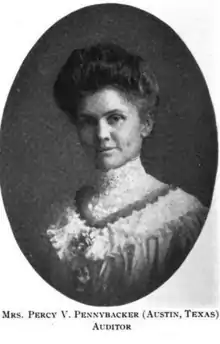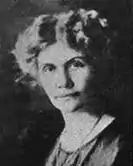Anna J. Hardwicke Pennybacker, known publicly after her marriage as Mrs. Percy V. Pennybacker, was the president of the American General Federation of Women's Clubs in the early 20th century, a Chautauqua speaker and a leader in the women's suffrage movement.[1][2]

Personal
Anna J. Hardwicke was born May 7, 1861, in Petersburg, Virginia, the daughter of John Benjamin Hardwicke, a Baptist minister, and his wife, the former Martha Dews. The family moved to Texas when she was 17, and in 1880 she graduated from the new Normal Institute in Huntsville, then taught in Bryan Grammar School. Before 1884 she taught in Missouri.[3] [4][5]
She and Percy Vivian Pennybacker were married on October 31, 1884, or November 1, 1884, in Smith County, Texas (1856-1899),[6][7][8] and they moved to Tyler, Texas, where he became school superintendent and appointed her as history teacher and principal at Central High School. She taught there for nine years, and in 1893 went with her husband to Palestine, Texas, where he had a new position.[4]
She was a friend of Eleanor Roosevelt; they were often guests of each other in their homes.[1][2][4]
She died February 4, 1938, in Austin.[3][9] Governor James V. Allred ordered the flag over the State Capitol to be lowered to half staff as a woman who has endeared herself to the hearts of all Texans."[2] A funeral service was at St. David's Episcopal Church.[10]
She was survived by two sons, Percy V. Pennybacker and Paul Bonner Pennybacker; a daughter, Ruth; and three siblings, A.S. Hardwicke, Mrs. T.T. Holloway and Mrs. B.C. Epperson.[2]
Activities
.png.webp)
After quitting her paid work, Mrs. Pennybacker became active in the women's club movement; in 1901-1903 she was head of the Texas federation of clubs and in San Francisco in 1912 she was elected president of the General Federation of Women's Clubs for a two-year term.[4] [11]

In 1888, she published A New History of Texas for Schools, which was adopted as the official text for public schools. In 1913, she told the fourth American Peace Conference that the then-current method of celebrating Independence Day in the United States was a "travesty." She suggested that
children form floral processions at school buildings, march to some central point which would be made the scene of a general celebration, in which places of honor would be given to young men who have arrived at the age of 21 within the year. She further advocated that speeches should be made to these young men and that civic oaths containing peace clauses should be administered.[13]
The same year she urged that measures be taken to enforce the 1906 Pure Food and Drug Act.[14]
In 1915, Mrs. Pennybacker became head of the National Women's Committee of Near East Relief, which had orphanages in Greece and in Palestine.[15]
A pacifist, she reluctantly supported American involvement in World War I.[4]
Afterwards, she set her goals on international peace and disarmament by working as a special correspondent to the League of Nations. She urged the United States to join the World Court and to sign the Kellogg-Briand Pact, renouncing war as an instrument of national policy.[4]

In a 1926 talk in Carnegie Hall, she told of her recent trip to Geneva and Greece.[16] She was noted as "one of the most gifted speakers on the platform today."[17]
Active in the Chautauqua movement, Mrs. Pennybacker persuaded John D. Rockefeller Jr. to donate money that staved off bankruptcy. in 1935. She also influenced President Franklin Delano Roosevelt to speak at a fund-raising event.[18]
Legacy
In Texas, a rose was named in her honor in 1929. It was noted as "A fine grower, with stout thornless canes coming freely from the base of the plant. Peach-pink with silvery suffusions in color."[19]
She bequeathed $5,000 to Sam Houston State Teachers College in Huntsville, Texas, to establish a Pennybacker scholarship "for the cultivation in the student body of a love for the true and beautiful in life."[20] [21]
References
- 1 2 "Mrs. Pennybacker Dies in Austin," Ada (Oklahoma) Weekly News, February 10, 1938, image 3
- 1 2 3 4 "Honors Paid Texas Woman," The El Paso Times, February 6, 1938, Page 1
- 1 2 "Know America: Today in History," The News, Frederick, Maryland, image 6
- 1 2 3 4 5 6 "Anna Pennybacker, Teacher, Author, Activist, 1861-1938," Great Texas Women, Kinsolving Hall, University of Texas at Austin, undated
- ↑ One source said she continued her education in Europe. Stacy A. Cordery, "Pennybacker, Anna J. Hardwicke," Texas State Historical Association, undated
- ↑ Pennsylvania and New Jersey, Church and Town Records, A Genealogy of the Pennybacker Family
- ↑ Smith County Marriage Records, Volume 1, page 502
- ↑ Source Ancestry.com. Texas, Marriage Index, 1824-2014 [database on-line]. Provo, Utah: Ancestry.com Operations Inc, 2005
- ↑ "Ataturk Sole State Head to Die in 1938, image 14
- ↑ "Simplicity Marks Pennybacker Rites," Sunday American-Statesman, Austin, February 6, 1938, Page 1
- ↑ "Biennial at Chicago," The Leavenworth Times, May 27, 1914, image 5
- ↑ Marguerite Martyn, Mrs. Pennybacker Dainty and Vivacious With Thousand Uplifting Endeavors," St. Louis Post-Dispatch, February 20, 1913, image 13
- ↑ "City Officials Indorse Clubwoman's Plan for Independence Day Celebration," Brooklyn Daily Eagle, June 15, 1913, image 20
- ↑ "Women May Enforce Laws," The Minneapolis Morning Tribune, October 9, 1912, page 1
- ↑ "Head of National Committee of Near East Relief," The Boston Globe, September 3, 1925, image 15
- ↑ "Well Known Clubwoman Tells of Geneva Trip," The News-Herald, April 17, image 15
- ↑ "Week-End Guest," The Daily Times, Davenport, Iowa, November 14, 1931, image 6
- ↑ Stacy A. Cordery, "Pennybacker, Anna J. Hardwicke," Texas State Historical Association, 2010 and 2017
- ↑ Advertisement, The Austin American-Statesman, March 31, image 65
- ↑ "Public Bequests Are Included in Pennybacker Will," The Austin American, February 8, 1938, page 1
- ↑ Sam Houston State University